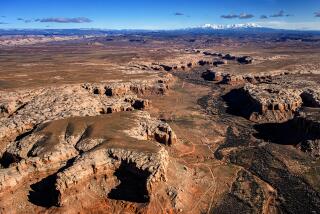Babbitt Tries to Ease Concerns Over Administration Land Policies
- Share via
DENVER — Interior Secretary Bruce Babbitt tried to persuade skeptical Western officials Friday that the Clinton Administration is not trying to usurp control over land management and other natural-resource decisions.
Babbitt, addressing several governors and dozens of local politicians at a conference here, said local input is the only way to resolve a century of conflicts over the 500 million acres of federally owned land across the West.
“We’re ready . . . to go back to the grass roots” for solutions, Babbitt said. But in what he called a tacit bargain, he said the Administration expects decisions to be made with input from all parties interested in the fate of the land--from farmers and ranchers to sports enthusiasts and environmentalists.
“It’s the only way of ending this war,” Babbitt said at a regional meeting here of the centrist Democratic Leadership Council.
He was talking about the “war” between environmental and industrial interests. Another “war” is the one that some Republicans claim the Administration is waging on the West.
The Interior Department alienated Westerners last year with what was widely viewed as a dictatorial approach to reforming grazing practices on federal lands.
After a couple of Senate filibusters, Babbitt came back in March with a proposal that raised grazing fees less steeply, offered discounts for ranchers with good environmental practices and allowed for more local control of rangeland policies.
But the reception has been mixed, at least partly because the first round of changes left lingering doubts about the White House attitude toward the West.
Wyoming Gov. Mike Sullivan said Babbitt heard views of 1,000 people on grazing reform at a meeting last year, but “the grass roots got foreclosed” in the first Administration attempt to change rangeland polices.
Now the grass-roots focus may be back, Sullivan said, “but in the process something was lost. What was lost was trust.”
Nevada Gov. Robert Miller praised Babbitt for rethinking his position on grazing and for being “out here trying to get direct input. It’s a presence that hasn’t been there in the past.”
But he also said there’s been little grass-roots contribution to the current debate over an 1872 mining law the Administration is trying to change. Already both houses of Congress have passed reform bills imposing royalties on mining companies, but Western states are still trying to weigh in.
“I would have liked to have seen a more balanced approach,” Miller said.
Colorado Gov. Roy Romer called the mining issue “very much unresolved. We may have differences with the department position.”
Romer was effusive, however, about Babbitt’s evolution on grazing reform.
Colorado provided the model for the pending federal rangeland proposal. Babbitt came here eight times in eight weeks to work with state ranchers and environmentalists who eventually agreed unanimously on a rangeland policy.
“He’s attempted to respond creatively,” Romer said. “I find him moving our way in a cooperative spirit.”
More to Read
Get the L.A. Times Politics newsletter
Deeply reported insights into legislation, politics and policy from Sacramento, Washington and beyond. In your inbox twice per week.
You may occasionally receive promotional content from the Los Angeles Times.










